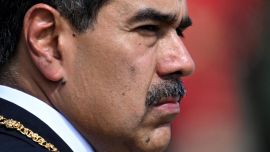The Organisation of American States (OAS) began a hectic general assembly in the Paraguayan capital of Asunción on Wednesday, marked by an attempted coup in Bolivia and new disagreements with President Javier Milei's Argentina, which has objected to resolutions on human rights and gender equality.
The OAS "will not tolerate any form of violation of the legitimate constitutional order in Bolivia or anywhere else," said the organisation's secretary general, Luis Almagro, as he condemned the irregular deployment of the Bolivian Army in La Paz.
Tanks and troops led by General Juan José Zúñiga – who was later removed as Army commander and detained by the police – occupied the Plaza Murillo in Bolivia's political centre. The military attempted to break down a door of the presidential palace with one of the vehicles, in a move that Bolivian President Luis Arce branded a "coup d'état,"
At the opening ceremony of this OAS assembly, host president Santiago Peña, "strongly condemned any attempt to subvert sacred democracy" and said Paraguay and the bloc would support "the legitimate government of comrade Luis Arce."
Blackballed resolutions
The beginning of the hemispheric organisation's highest summit was also dragged down by disagreements between representatives. Last week, Argentina blackballed resolutions related to democracy and the environment mentioning the need to include gender and ethnic perspectives in the issues tackled by the organisation.
Sonia Cavallo, Argentina’s ambassador to the OAS, questioned among other things a paragraph in the resolution on Haiti which mentioned the need to combat sexual and gender violence, running into the opposition of her United States counterpart Frank Mora, who argued that "gender violence is a serious and very widespread problem" in the Caribbean country.
Asked about Argentina's position, Almagro said on Tuesday that there are always "great difficulties reaching agreements … and the discussion needs to be pluralistic and diverse."
Argentina’s swing to the right, and its brusque relationship with Brazil, is also complicating proceedings.
Brazilian President Luiz Inácio Lula da Silva said on Wednesday that he will not speak to Milei until he apologises to him and to Brazil for the "nonsense" he has said previously.
Argentina’s Presidency responded shortly afterwards that Milei "has not committed anything for which he has to repent.”
Milei called the leftist leader "corrupt" and a "wild leftist" before he took office in December last year.
An Amnesty International communiqué last Tuesday criticised Argentina’s "regressive stance" within the OAS, alerting that this posture comes on top of the Argentine Foreign Ministry’s announcement that it would suspend all participation in events linked to the Agenda 2030 of the United Nations. The plan’s aims are the elimination of poverty, gender equality, education, food security, inclusive economic growth and the urgent combat against climate change and its effects, among other issues.
But Milei is a firm detractor: "We’re not going to adhere to the Agenda 2030, to cultural Marxism and to decadence," he declared during the election campaign.
‘Let’s not be naïve’
The 54th general assembly of the OAS, which officially began on Wednesday evening at the headquarters of the CONMEBOL Latin American football association in Asunción, groups 23 foreign ministers of the region seeking consensus regarding the defence of democracy, human rights, security and development.
Among its priorities is Venezuela, whose government formally abandoned the OAS in 2019 after requesting its exit two years previously, accusing the organisation of being a "space for imperialistic domination."
US Ambassador Mora pointed out last week that member countries could not be "naive about the situation in Venezuela" where the arrests of opposition politicians are on the rise.
Venezuelan President Nicolás Maduro will be seeking re-election for a further six-year term on July 28 in elections closely watched by the international community in which most opinion polls show the opposition headed by María Corina Machado and her candidate Edmundo González to be in the lead.
Also on the agenda is the situation in Nicaragua, where Daniel Ortega has governed for the last 17 years after being successively re-elected in elections questioned by the international community, as well as Haiti, immersed in a profound crisis.
"The eradication of poverty, the protection of the environment and the battle against climate change will be priorities," said OAS assistant secretary-general Néstor Méndez last Tuesday.
related news
by Martín Raschinsky, AFP




















Comments